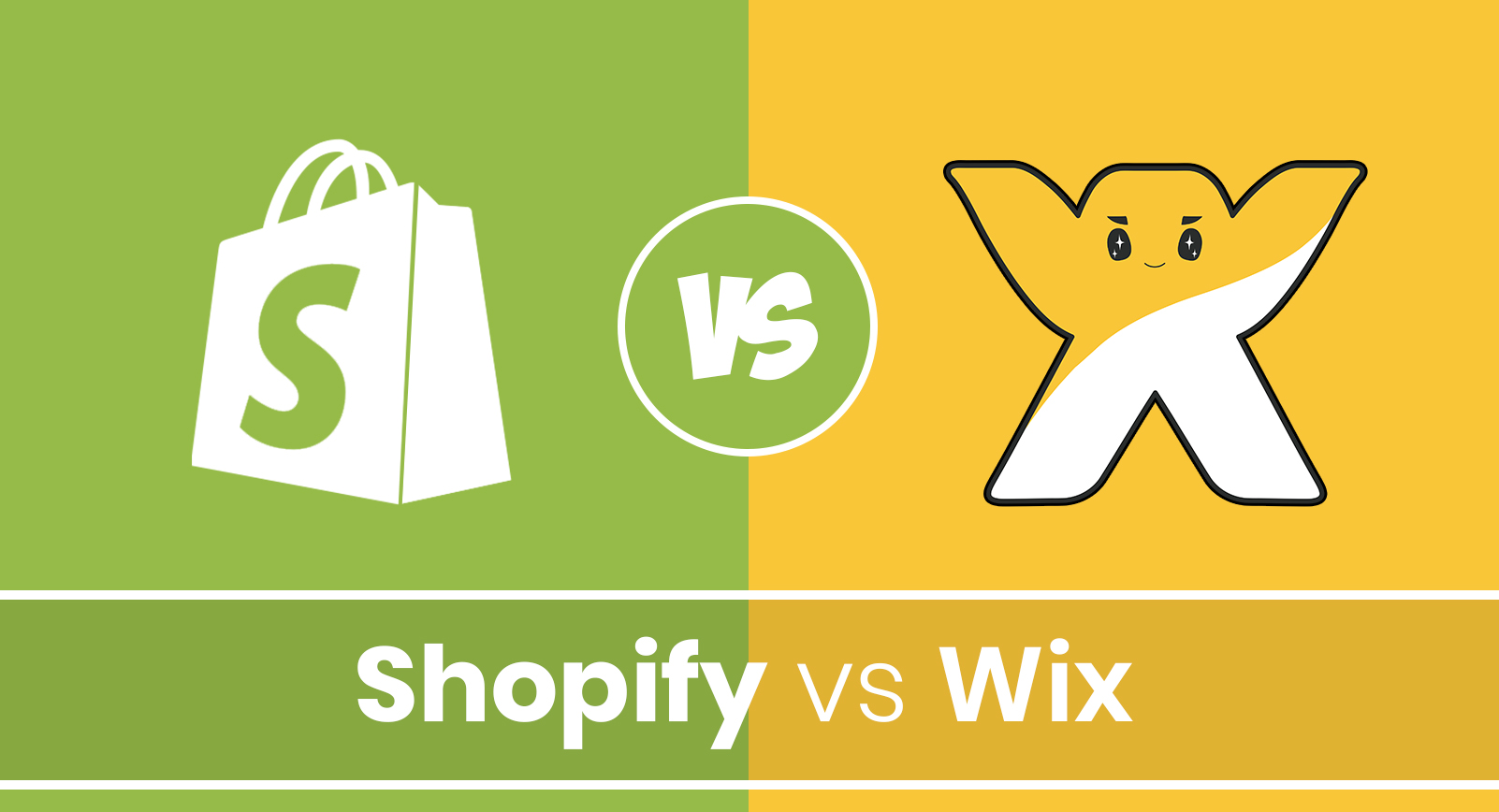Update May 2019: We’ve updated this post to reflect some Wix pricing changes and to make it easier to skim through our conclusions. If you’re curious about which platform performs best in a particular area of e-commerce, leave a comment below!
Who has the time to actually go out, window shop, and physically go into a stores nowadays? Everyone seems to be running out of time. Most people have succumbed to online shopping. The performance of e-commerce sites in the last ten years can attest to that. Life has become hectic, and every day is a continuous struggle in time management. The luxury and the smart deals that we get from online stores have lured us into a new and perhaps indispensable culture. E-commerce has revolutionized business. As the years go by, the battle of the best store builder continues. Two online store builders have fought for the spotlight – Shopify and Wix.
Choosing between the two is tough, but with this thorough comparison, you’ll hopefully come into the conclusion on what platform is best for your needs, and once and for all, end your dilemma. We have deep insight into this topic since we offer e-Commerce development services to our clients, and we wanted to offer some of the wisdom we’ve gained from using both platforms.
Evaluating Your Needs
Basically, most online store sellers would choose an e-commerce store builder that is all inclusive, one that would provide them with everything they need for their website to grow. What you choose affects your business short term and long term. In the long run, the functionality, versatility, and your brand identity are all affected and influenced by the platform that you choose. For example, there is no such thing as a perfect house for everyone. We all have our own dream house, one that suits our own needs and preferences. The same is true in choosing an e-commerce builder. One size simply doesn’t fit all.
The online store builder that you pick is your landlord. Getting one can be likened to leasing an office space. You can choose your own wall paint, take control of what decors to use, and clean the whole area. But when it comes to the major issues, the landlord is still in charge. Plumbing, construction, and security are still left in the hands of the landlord. This is also what happens when you use an online store builder. The most crucial question to ask yourself is this: which one provides me utmost assistance and convenience while also giving me control?
A Detailed Comparison of Shopify and Wix

Over-All Appearance
When you window shop, your decision to come in depends on the store’s front. Looks matter when it comes to business. Your customer’s first impression lasts. It’s the same way with online stores. The overall look reflects the nature of your business. One thing is for sure; your website should both be designed appropriately in accordance with your business. Take for example, if you are selling artwork, you cannot choose a grid layout. You need a website that would promote each piece for you to sell. Luckily, Both Shopify and Wix are abundant with design options.
Wix
As we all are in the beginning, merely the design and layout of our website already give us a major headache. Wix is great choice for beginners. If you’re new in the industry, Wix offers plenty of functional templates that are easy to use. They have templates and themes designed for wide range of businesses which in turn means that the templates also lack focus. Their collection is sleek, very contemporary, and also highly responsive. They also offer lots of free ones. But we would be doubtful with its scalability.
If you’re wondering why we are saying that Wix is for beginners, it is because we feel like when compared to Shopify, it is much less professional-looking. The themes and the templates are diverse and highly varied, and yes, there is a certain degree of professionalism, but some themes can look a little cluttered. For the overall appearance, we’d say that Wix focuses on the accessibility. We can give it the credit of making things easier and simpler for beginners. As for the ones who have been in the industry for a longer, we can hope that they would be able to expand and add more customization option in their products soon.
Shopify
Shopify is where you should go if you are ready to spend for your website. Simply put, it is clearly meant for those who have well-established businesses. Shopify actually has the same degree of ease in terms of use. Most of the themes are relatively easy to edit and customize. You can tweak most themes however you like. The catch is that, most of them will cost you money compared to Wix. It’s not going to cost you a fortune, though. $80 is definitely worth it when you think of the limitless design opportunities, ease of use, customization options, scalability, and higher mobile responsiveness that come with Shopify themes.
Check out our post on the Best Shopify Themes to see some beautiful examples.
You see, it really depends on your needs and your own capabilities. Where you stand and what your goals matters when it comes to choosing the e-commerce platform in terms of their overall appearance.
Pricing
Comparing prices between Wix and Shopify can be difficult. This is primarily because they can have different target markets.
- Shopify is mainly a platform that offers its services to online stores
- Anyone in any industry, whether e-commerce or not, can utilize Wix
To put things simply, Shopify is more expensive than Wix. But the cheapest plan on Shopify has more features than the most expensive plan on Wix. You can spend a maximum of $40 a month on Wix with their Business VIP plan, while the cheapest plan on Shopify is already at $29 a month.
E-Commerce Features
Basically, e-commerce should consist of a product database, shopping cart, payment processer, order database, and a checkout page. But the game has changed over time with new technology and apps. Now you need a lot more than these simple features.
There are sellers who link with Amazon FBA and eBay or sell through Facebook. Advertising has also expanded that there are now platforms like Google Merchant, Buyable Pins, and Twitter Cards. Furthermore, online sellers also include promos, discounts, and coupons that would mean more tweaks on your online store itself. Nowadays, even shippers such as USPS are synced within the vendor’s website.
Of course, not everything is compulsory when you open an online store. You, the seller, always have the right to decide which features you need. However, you should also consider the fact that your business can expand and you might need these more intricate specifications in the future.
This factor, unfortunately, makes it harder for Wix to win in the battle. For one, Shopify was already specifically designed to be an online store website builder. Shopify has all the possible features that you can integrate to your online store. They are already linked to numerous credible apps that can help you improve each feature that you want to add to your website. Shopify simply provides you with everything you need for e-commerce. But, we also give Wix the credit for offering plenty of themes that can provide simple and straightforward online selling.
Shopify has third-party apps, such as Cross-Sell and Up-Sell Apps. Wix also has an app market to improve functionality.
SEO, Integrations, and Features
An e-commerce site is not as simple as it looks. More than your product display comes a lot of core functionality demands. Yes, you want to sell things, but it also means that you need a website that will also help you control the inventory, provide you with shipping information, integrate and grow your brand in social media, and also translate your website in different languages.
Both Wix and Shopify have all these tools, including some search engine optimization. We just need to check which one of them offers a little bit more.
For newbie entrepreneurs, Wix has all the key e-commerce features, but only with fewer options. For example, its inventory is not as efficient because you just watch as the stock goes down once you sell it. The app store where you can get these add-ons on Wix is also difficult to navigate.
Both Wix and Shopify are efficient in social media integrations. With the right target words and the use of the most appropriate SEO tools, both platforms can spread like fire on social media.
However, you still need to install an app for social media on Shopify, while it already comes with Wix. This might give you some relief because there are two aspects where Wix is better than Shopify – language integration and customer support.
Unlike Shopify, you can easily customize language translations in Wix. It only takes a few clicks to add other languages in Wix. Issues, whether minor or major, are promptly attended by Wix support. Their teams are experts in the game and can provide you with assistance any time of the day.
For entrepreneurs who are always on the go, Shopify takes it as a notch higher with their POS system. This is only a recent development but they already have a lot of positive feedback about it. Shopify POS helps you manage your offline store in your online store. It allows you to accept payments by merely connecting your store to an iPad. This service might be the most distinct offering by Shopify.
Putting all features, integrations, and SEO factors into perspective, we’d say that it is another win for Shopify. While they are both great platforms, Shopify takes it away with its matchless features which are all purposely designed for online stores.
Summary
Now, that we have compared the major aspects between Wix and Shopify, we have also included a summary in bullet form to help you compare the two according to its major features, preferred user group, and convenience. We hope you keep in mind if you need any help in the e-commerce development process you keep our team in mind!
Wix
Main Features:
- Extensive collection of design templates
- Comes with a built-in drag-and-drop store builder
- Includes photo galleries for product showcase
- Mobile optimization
- Global shipping
- Tax management tools
- Convenient order tracking
- Secured and retentive shopping cart
- Customizable templates filtered by general categories
- Wide selection of web apps and add-on services available
- Hosting included
Preferred User Group
Beginners in online selling and newbie entrepreneurs are perfect Wix users. Wix provides templates and designs that are easy to use, straightforward, simple, and highly-functional. With little knowledge, one can build a good online store through Wix. It has a wide range of templates where you can integrate e-commerce easily.
Convenience
Wix is very simple. All you need to do is sign up, choose your design category, select a template, and you’re good to go. It guides you step by step and takes you to the next procedure as it breezes you through its options and customizations. It’s perfect for those who are not familiar with website technicalities.
Shopify
Main Features:
- Offers hundreds of professionally-designed themes
- Excellently mobile-responsive
- User-friendly in all browsing devices
- Direct access to HTML and CSS
- Option to add own domain names
- Efficient website builder
- Equipped with a full blogging platform
- Email-marketing
- High-end SEO tools
- Site metrics
- Unlimited bandwidth
Preferred User Group:
Shopify is a great option both for newbies and professionals. Beginners get to experience a whole new process, but with assistance. Long-time online store owners would appreciate the wide range of customization options and settings that only Shopify can provide.
Convenience
Shopify is actually not that difficult to use. Customizing it is still doable for any patient beginner. Simply create an account, choose a theme, customize a design, and you’re ready. All one needs to do is to follow on the instructions on the left side of the menu. It may be a lot, but everything is also straightforward once you get used to it.
So, which is the better fit for your project, you ask? There is really no true competition here. The battle is not a fair one. Clearly, Shopify is the best option when it comes to e-commerce. But, Wix can also do the job for small business owners.
If you’re planning on running an online store and envisioning its expansion and growth in the future, you’d want all the endless features that Shopify has to offer. Wix might fit if you are all for a simple store with drag and drop features. Simply put, Wix is not a contender in e-commerce. There is no real battle here, but maybe it’s safe to say that it has its own edge – only that it’s not in e-commerce.




